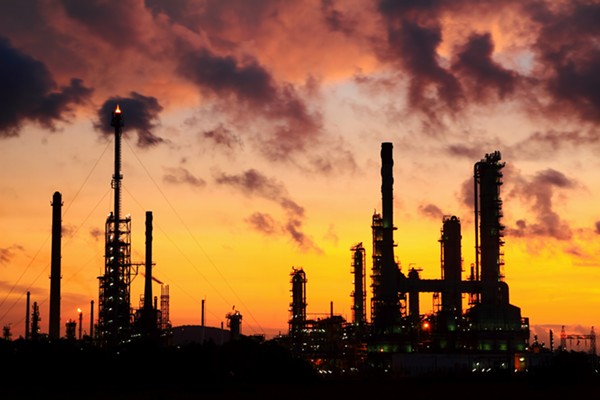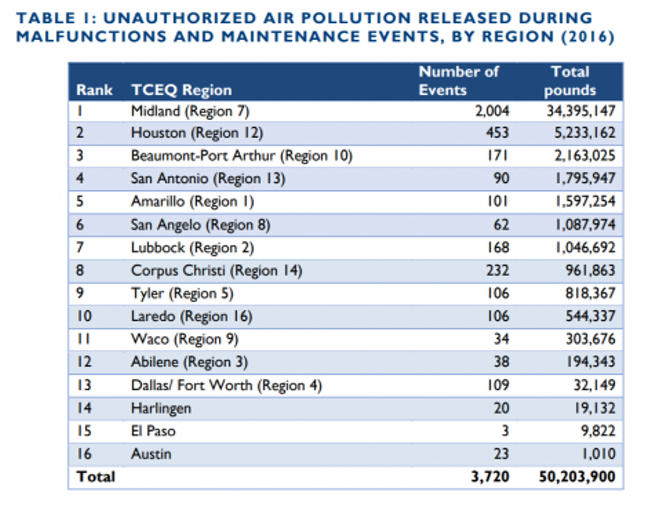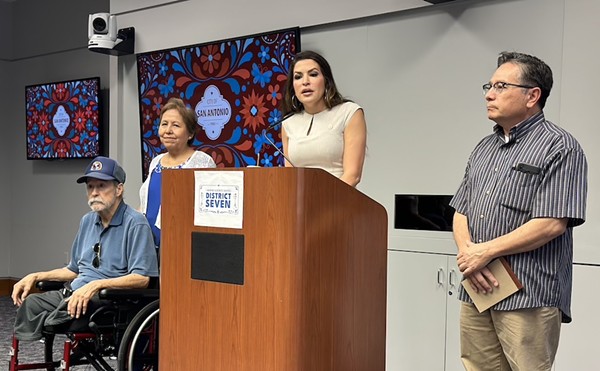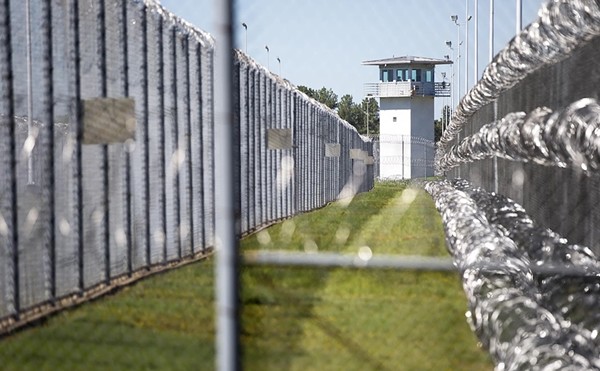Texas is Ignoring 97 Percent of Illegal Polluting from Oil Industry
By Sierra Juarez on Fri, Jul 7, 2017 at 5:09 pm
Texas has ignored at least 97 percent of all illegal polluting incidents reported at state oil and gas facilities, according to a report released Friday by Environment Texas and the Environmental Integrity Project. While the Texas Commission on Environmental Quality is expected to penalize and monitor companies that report releasing these toxic pollutants, records show it's only fined industries for 3 percent (588 out of 24,839) of the total incidents reported.
These "illegal" pollutants, like soot, sulfur dioxide and benzene, are usually released during malfunctions or maintenance issues at production, refinery or oil processing facilities. These chemicals contribute to asthma attacks and respiratory issues for folks living near the facility and include some of the greenhouse gases responsible for global warming. Between 2011 and 2016, these facilities pumped about 500 million pounds of these toxic pollutants into the Texas environment, without the state's intervention.
But state regulators aren't the only ones at fault here. Environment Texas Director Luke Metzger says industries are able to get out of paying fines for the malfunctions through "legal loopholes," which is, in part, why only 3 percent of these incidents have been adequately followed up on. And even if they get fined, the financial impact is minimal — the state charges companies on average three cents per pound of the released illegal pollutants. The report's authors said that industries don't feel compelled to fix their malfunctioning equipment because it cost less to pay for the unlikely penalties than to pay for updates or replacements.
"With less than a 3 percent chance of getting busted, it’s no wonder Texas polluters are repeatedly and flagrantly breaking the law," Metzger said in a news release. "It's the Wild West when it comes to environmental enforcement in Texas, except the Sheriff seems to be asleep at his desk."
The two groups that released the report asked TCEQ and state lawmakers to remedy the issues by making the state more accountable for enforcing pollution laws and making repeat violators prove that the pollutions released are unavoidable.
“The truth is, many of these industrial 'accidents’ can be avoided – as long as industry feels a financial incentive to improve," said Gabriel Clark-Leach, an attorney for the Environmental Integrity Project.
During 2016, San Antonio ranked fourth on the list of cities emitting illegal pollution into the air, due to malfunctions or maintenance issues in oil and gas facilities. Nearly 1.8 million pounds were released in San Antonio alone last year. Metzger told the Current that these emissions along with those from the city's neighbors can have a damaging impact on the health of San Antonians, the environment and the economy.
These extra pollutants put San Antonio closer to the verge of violating the Federal Clean Air Act, a standard the city's already close to flunking.
This report joins a legacy of questionable fumbles from the TCEQ that does more to harm the environment than help. Like when it okayed the construction of an Eagle Pass coal mine expected to contaminate the local water supply and destroy 100 Native American archeological sites. Or when the agency argued that dirty, polluted air is actually good for your health, meaning sate-level efforts to de-smog the air doesn't benefit the "public good."
These "illegal" pollutants, like soot, sulfur dioxide and benzene, are usually released during malfunctions or maintenance issues at production, refinery or oil processing facilities. These chemicals contribute to asthma attacks and respiratory issues for folks living near the facility and include some of the greenhouse gases responsible for global warming. Between 2011 and 2016, these facilities pumped about 500 million pounds of these toxic pollutants into the Texas environment, without the state's intervention.
But state regulators aren't the only ones at fault here. Environment Texas Director Luke Metzger says industries are able to get out of paying fines for the malfunctions through "legal loopholes," which is, in part, why only 3 percent of these incidents have been adequately followed up on. And even if they get fined, the financial impact is minimal — the state charges companies on average three cents per pound of the released illegal pollutants. The report's authors said that industries don't feel compelled to fix their malfunctioning equipment because it cost less to pay for the unlikely penalties than to pay for updates or replacements.
"With less than a 3 percent chance of getting busted, it’s no wonder Texas polluters are repeatedly and flagrantly breaking the law," Metzger said in a news release. "It's the Wild West when it comes to environmental enforcement in Texas, except the Sheriff seems to be asleep at his desk."
The two groups that released the report asked TCEQ and state lawmakers to remedy the issues by making the state more accountable for enforcing pollution laws and making repeat violators prove that the pollutions released are unavoidable.
“The truth is, many of these industrial 'accidents’ can be avoided – as long as industry feels a financial incentive to improve," said Gabriel Clark-Leach, an attorney for the Environmental Integrity Project.
During 2016, San Antonio ranked fourth on the list of cities emitting illegal pollution into the air, due to malfunctions or maintenance issues in oil and gas facilities. Nearly 1.8 million pounds were released in San Antonio alone last year. Metzger told the Current that these emissions along with those from the city's neighbors can have a damaging impact on the health of San Antonians, the environment and the economy.
These extra pollutants put San Antonio closer to the verge of violating the Federal Clean Air Act, a standard the city's already close to flunking.
This report joins a legacy of questionable fumbles from the TCEQ that does more to harm the environment than help. Like when it okayed the construction of an Eagle Pass coal mine expected to contaminate the local water supply and destroy 100 Native American archeological sites. Or when the agency argued that dirty, polluted air is actually good for your health, meaning sate-level efforts to de-smog the air doesn't benefit the "public good."

KEEP SA CURRENT!
Since 1986, the SA Current has served as the free, independent voice of San Antonio, and we want to keep it that way.
Becoming an SA Current Supporter for as little as $5 a month allows us to continue offering readers access to our coverage of local news, food, nightlife, events, and culture with no paywalls.
Scroll to read more San Antonio News articles
Newsletters
Join SA Current Newsletters
Subscribe now to get the latest news delivered right to your inbox.


















